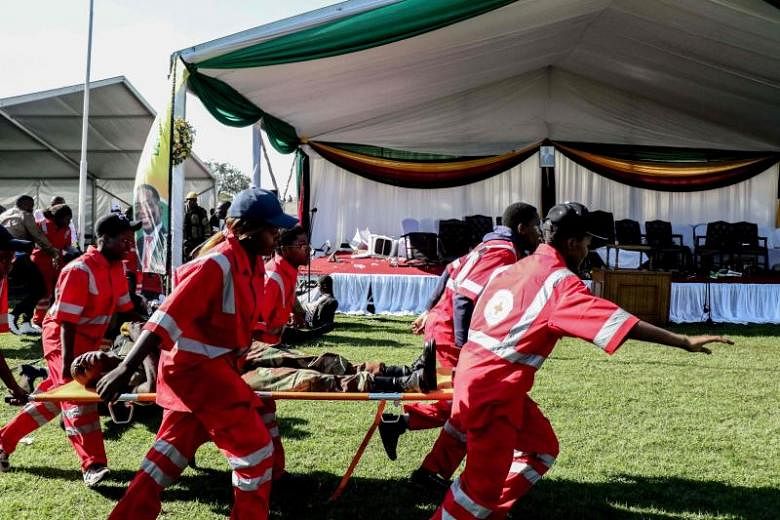HARARE (REUTERS) - Police said on Sunday (June 24) they were searching for a motive for an explosion at Zimbabwean President Emmerson Mnangagwa's election rally that injured 49 people.
Vice President Constantino Chiwenga, the general who led a de facto coup that forced long-time leader Robert Mugabe to resign in November, described Saturday's (June 23) blast as a "terrorist act" that would not stop the July 30 presidential, parliamentary and local elections, Zimbabwe's first post-Mugabe vote.
"The police will hunt down the criminals. They will be hunted down and they will be brought before the law," Chiwenga told a campaign rally of the ruling ZANU-PF party in the town of Chitungwiza, 30 km (20 miles) south of the capital Harare.
Mugabe has said he felt betrayed by Mnangagwa, his former protege, and has called his presidency illegal.
Mnangagwa, 75, and Nelson Chamisa, 40, the leader of the opposition Movement for Democratic Change, are the main contenders in next month's vote.
Chiwenga's wife was among those injured and police said the toll could rise as more people came forward.
National police spokeswoman Charity Charamba said police were pursuing leads after the blast at a stadium in Bulawayo, the opposition heartland where ZANU-PF has lost all national elections since 2000. Mnangagwa escaped injury.
Charamba told reporters a "substantial reward" was being offered for information. She did not give details.
It was not clear who was responsible for the explosion, which Mnangagwa called a cowardly act, or how the security around the president was breached.
Mnangagwa adopted most of Mugabe's security and bureaucratic system, fearing a complete overhaul, which the military had sought, could cause government instability and cost him votes.
FACTIONS
As internal security minister at independence in 1980, Mnangagwa built the system that protected Mugabe, but as tensions rose over who would succeed the 94-year-old, it broke into factions.
Without mentioning names, Mnangagwa said there were some people who did not accept his presidency and his "usual enemies"were behind the blast.
Two sources close to Mnangagwa said some Mugabe loyalists in the security and government establishment were "hurting" over the November coup.
"You cannot say this is a terrorist act and neither can you say it was done by state actors who want to take power. These are people who are hurting, who want to harm the president and they have access," one of the sources told Reuters, declining to be named.
South African President Cyril Rampahosa condemned the attack and said the regional Southern African Development Community would "evaluate the incident and appropriate steps."
Among Zimbabwe's small but vibrant Twitter and Facebook communities, people posted theories, including accusations this was an inside job meant to gain sympathy votes in an opposition stronghold.
Hasnain Malik, global head of equity research at Exotix Capital said Saturday's incident could have been a result of tensions within Mnangagwa's government.
"There are two long-standing tensions in Zimbabwe: First, within ZANU-PF, between Mnangagwa's Lacoste faction and Mugabe's G40 factions, with an undertone of tribal tension," Malik said in a note to investors.

